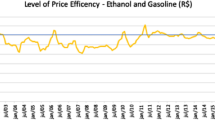Abstract
The objective of this paper is to estimate the impact of reducing carbon dioxide emissions from fossil fuel combustion activities on economic activity in Portugal. We find that energy consumption has a significant impact on macroeconomic activity. In fact, a 1 ton of oil equivalent permanent reduction in aggregate energy consumption reduces output in the long term by €6,340. More importantly, and since carbon dioxide emissions are linearly related to the amounts of fuel consumed, our results allow us to estimate the costs of reductions in carbon dioxide emissions. We estimate that a uniform standard for reducing carbon dioxide emissions from fossil fuel combustion activities would lead to a marginal abatement cost of €95.74 per ton of carbon dioxide. This is a first rough estimate of the potential economic costs of policies designed to reduce carbon dioxide emissions. At this level one may conclude that uniform, across the board reductions in carbon emissions would have a clear negative effect on economic activity. Hence, at the aggregate level there is clear evidence for a trade-off between economic performance and a reduction in carbon emissions. This opens the door to the investigation of the scope for policy to minimize the costs of environmental policy and regulation.

Similar content being viewed by others
References
Asafu-Adjaye J (2000) The relationship between energy consumption, energy prices and economic growth: time series evidence from Asian developing countries. Energy Econ 22(6):615–625
Banco de Portugal (1997) Séries longas para a economia Portuguesa. Banco de Portugal, Lisboa
Barker T, Ekins P, Foxon T (2007) Macroeconomic effects of efficiency policies for energy-intensive industries: the case of the UK climate change agreements, 2000–2010. Energy Econ 29:760–778
Cheng BS, Lai TW (1997) An investigation of co-integration and causality between energy consumption and economic activity in Taiwan. Energy Econ 19(4):435–444
Chen W, Wu Z, He J, Gao P, Xu S (2005) Carbon emission control strategies for China: a comparative study with partial and general equilibrium versions of the China MARKAL model. Energy 32(1):59–72
Christiano L, Eichenbaum M, Evans C (1996) The effects of monetary policy shocks: evidence from the flow of funds. Rev Econ Stat 78(1):16–34
Christiano L, Eichenbaum M, Evans C (1998) Monetary policy shocks: what have we learned and to what end? NBER 6400
Commission of the European Communities (1999) European economy 69. Commission of the European Communities, Brussels
Crompton P, Wu (2005) Energy consumption in China: past trends and future directions. Energy Econ 27:195–208
Direcção Geral de Energia (2008) Balancos energeticos. http://www.dgge.pt/
Energy Information Administration, U.S. Department of Energy (2002) Model documentation report: macroeconomic activity module of the national energy modelling system. Office of Integrated Analysis and Forecasting
Francis BM, Mosley L, Iyare SO (2007) Energy consumption and projected growth in selected Caribbean countries. Energy Econ 29:1224–1232
Gaskins DW Jr, Weyant JP (1993) Model comparisons of the costs of reducing CO2 emissions. Am Econ Rev 83(2):318–323
Gonzalo J, Lee T (1998) Pitfalls in testing for long run relationships. J Econom 86:129–154
Gonzalo J, Pitarakis J-Y (1999) Dimensionality effect in cointegration analysis. In: Engle R, White H (eds) Festschrift in honour of clive granger. Oxford University Press, Oxford pp 212–229
Grubb M, Edmonds J et al (1993) The costs of limiting fossil-fuels CO2 emissions: a survey and analysis. Annu Rev Energy Environ 18:397–478
Hue GJY, Xu HM (2000) Impact of mitigating CO2 emissions on Taiwan’s economy: a fuzzy multi-objective programming approach. Environ Econ Policy Stud 3:335–345
Jorgenson D (1998) Growth volume 2: energy, the environment, and economic growth. The MIT Press, Cambridge
Lasky M (2003) The economic costs of reducing emissions of greenhouse gases: a survey of economic models. Congressional Budget Office, Macroeconomic Analysis Division, Washington
Manne AS, Richels RG (1992) Buying greenhouse gas insurance: the economic costs of CO2 emission limits. MIT Press, Cambridge
Masih AMM, Masih R (1996) Energy consumption, real income and temporal causality: results from a multi-country study based on cointegration and error-correction modelling techniques. Energy Econ 18(3):165–183
Ministério das Finanças (2006) The Portuguese economy. DGEP, Lisboa
Nordhaus W (1993) Reflections on the economics of climate change. J Econ Perspect 7(4):11–25
Oh W, Lee K (2004) Causal relationship between energy consumption and GDP revisited: the case of Korea 1970–1999. Energy Econ 26:51–59
Perobelli FS, Mattos RS, Haddad EA, Silva MPN (2007) An integrated econometric + input-output model for the Brazilian economy: an application to the energy sector. Ecomod2007: International Conference on Policy Modeling. Sao Paulo
Resolucao do Conselho de Ministros n. 104/2006. http://www.dre.pt/pdf1sdip/2006/08/16200/60426056.PDF
Rudebusch G (1998) Do measures of monetary policy in a VAR make sense? Int Econ Rev 39:907–931
Scott MJ, Roop JM, Schultz RW, Anderson DM, Cort KA (2008) The impact of DOE building technology energy efficiency programs on U.S. employment, income and investment. Energy Econ 30(2):2283–2301
Sims CA, Zha T (1999) Error bands for impulse responses. Econometrica 67(5):1113–1155
Stern DI (1993) Energy and economic growth in the USA—a multivariate approach. Energy Econ 15(2):137–150
Stern DI (2000) A multivariate cointegration analysis of the role of energy in the US macroeconomy. Energy Econ 22(2):267–283
Zhang ZX, Folmer H (1998) Economic modeling approaches to cost estimates for the control of carbon dioxide emissions. Energy Econ 20:101–120
Author information
Authors and Affiliations
Corresponding author
Additional information
This paper is part of a research project financed by a grant from the Fundação de Ciência e Tecnologia do Ministério da Ciência e Tecnologia—Portugal, reference PTDC/ECO/72065/2006. We would like to thank participants of the 3rd Meetings of the Portuguese Economic Journal in June 2009 in Madeira, Portugal, the First Research Workshop of the CASEE in July 2009 in Faro, Portugal, as well as an anonymous referee for very helpful comments and suggestions.
About this article
Cite this article
Pereira, A.M., Pereira, R.M.M. On the potential economic costs of cutting carbon dioxide emissions in Portugal. Port Econ J 9, 211–222 (2010). https://doi.org/10.1007/s10258-010-0061-9
Received:
Accepted:
Published:
Issue Date:
DOI: https://doi.org/10.1007/s10258-010-0061-9




